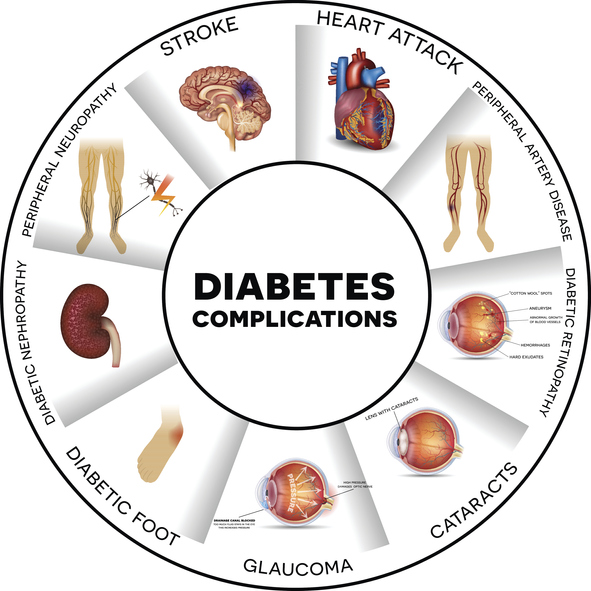Weight Loss Can Help You Prevent Diabetes Complications
By Andrew Briskin
 If you have type 2 diabetes, reaching and maintaining a healthy weight is crucial for managing your blood sugar and preventing complications. Find out about the connection between diabetes and excess weight, and which methods you can use for weight management.
If you have type 2 diabetes, reaching and maintaining a healthy weight is crucial for managing your blood sugar and preventing complications. Find out about the connection between diabetes and excess weight, and which methods you can use for weight management.
The Connection Between Obesity and Diabetes
Though researchers do not fully understand the link between obesity and type 2 diabetes, it is clear that the two conditions are closely linked. According to a study conducted in the United Kingdom, about 90% of people with type 2 diabetes have excess weight or obesity. Also, both conditions are metabolic disorders caused by many different genetic, environmental, and behavioral factors. However, not everyone with diabetes has obesity, and vice versa.
In recent years, researchers have looked at the effect of fat buildup around the liver and pancreas as a potential link between obesity and type 2 diabetes. Fat buildup around the liver and pancreas is known to be associated with insulin resistance – the main characteristic of type 2 diabetes where the body gradually becomes less sensitive to insulin, coupled with reduced insulin production from the pancreas. When the body cannot make enough insulin to overcome this resistance, glucose levels in the blood rise. Over time, these high glucose levels can lead to complications like heart disease, stroke, chronic kidney disease, vision loss, and nerve damage.
Many believe that reducing fat around the liver and pancreas through weight loss helps decrease insulin resistance and restore normal insulin production. A research study called “DiRECT”, published in 2018, was the first trial to demonstrate the effects of weight loss alone on the potential to achieve type 2 diabetes remission. In the DiRECT trial, type 2 diabetes remission was defined as maintaining an A1C below 6.5% for at least two months without taking any glucose-lowering medications. Investigators recruited individuals aged 20–65 years who had been diagnosed with type 2 diabetes within the past six years, had a body-mass index (BMI) of 27–45 kg/m2, and were not receiving insulin.
Though remission may not be possible for all people with type 2 diabetes, this study found that among participants who lost 15 kilograms (33 lbs) or more, a staggering 86% achieved diabetes remission by the end of the 12-month study. This occurred regardless of the participant’s weight at the start of the trial; the percentage of people achieving remission increased with the amount of weight lost. Additionally, a follow-up study showed that people who saw a return of their diabetes symptoms had a significant rise in fat around the liver and pancreas. The rise in liver and pancreas fat was not seen in people who maintained remission.
This study demonstrated that losing weight significantly improved the chance of achieving diabetes remission, lowering A1C, and, in turn, reducing the risk for complications in the people with type 2 diabetes who were eligible for the study.
Weight Loss Treatments for People with Diabetes
Even small amounts of sustained weight loss (5-10% of body weight) can have a huge effect on A1C and Time in Range and reduce the risk for complications. While weight loss can be extremely challenging, some medications, technology, procedures, and lifestyle changes can make the goal more attainable.
Weight Loss Medications
Two similar classes of glucose-lowering medications, GLP-1 receptor agonists and dual GLP-1/GIP receptor agonists, have been shown to help people with diabetes manage their weight as well as lower their A1C.
GLP-1 receptor agonists help people cut down on calories by slowing the emptying of the stomach, which increases the feeling of fullness. Some GLP-1s have also been shown to lower the risk of heart disease. GLP-1 drugs approved for weight loss include Saxenda (liraglutide) and Wegovy (semaglutide). In a clinical trial for Wegovy, over 83% of people taking the drug (coupled with exercise and dietary changes) lost at least 5% of their body weight. Only 31% of people achieved this level of weight loss with exercise and diet alone.
Earlier in 2022, the FDA approved Mounjaro (tirzepatide) as a glucose-lowering drug for people with type 2 diabetes. Mounjaro is a dual GIP/GLP-1 receptor agonist or dual agonist, which affects two different, but related biological pathways, as opposed to just one. Though the drug has not been approved exclusively for weight loss, results of clinical trials have been outstanding. The most recent trial data showed that people taking the highest dose of tirzepatide lost an average of 22.5% of their body weight. Over 63% of people on this dose lost at least 20% of their body weight.
Bariatric surgery
Studies have shown that bariatric surgery can help people achieve long-term weight loss, improve glucose levels, and reduce the risk for heart disease and other complications that affect the eyes, kidneys, and nerves. Bariatric surgery works by altering the digestive system so that food bypasses part of the intestines. Some surgeries also work by reducing the size of the stomach.
However, bariatric surgery is not for everyone. To learn more about the procedures, read: Bariatric Surgery – Is it the Right Option for You?
Lifestyle Changes for Weight Loss
Changes to diet and exercise can help people improve glucose management and even achieve remission. Though weight loss through diet and exercise alone can be a very difficult task, it is possible. Some strategies include developing a nutrition plan, setting small and incremental weight loss goals, and finding exercises that are enjoyable.
Talk to your healthcare provider to establish a diet and exercise routine that works best for you, and check to see if you may benefit from one of the weight loss medications. Additionally, you can locate a nutrition expert near you with this resource. For more information about weight-loss strategies, read:








